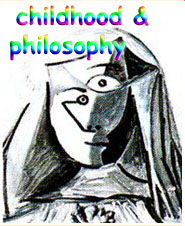la infancia en el cinema de abbas kiarostami
DOI:
https://doi.org/10.12957/childphilo.2019.36890Palabras clave:
infancia, cinema, abbas kiarostami, revolución iraníResumen
Este artículo se dedica a describir y analizar el acercamiento a la infancia en algunas obras cinematográficas de Abbas Kiarostami. Para eso, la argumentación se volvió inicialmente a la contextualización de la Revolución Iraní de 1979, responsable del fin del régimen monárquico del Sha Reza Pahlavi, que tenía la laicidad y la modernidad como motes, y del inicio de la República Islámica de Irán, centrada en la figura del ayatolá Jomeini y apoyada en la tradición islámica. En ese escenario, se destaca el papel del Instituto para el Desarrollo Cultural del Niño y del Adolescente, referido como Kanun. Fundado con el propósito de crear obras de cuño educativo durante el régimen del Sha, el Kanun fue de fundamental importancia para la producción artístico-cultural del país, tanto antes como después de la Revolución. Especialmente, su departamento de cine, en el que varios cineastas iniciaron sus carreras (entre ellos, Kiarostami, el primer director del departamento), es considerado la cuna del movimiento reconocido como el Nuevo Cine Iraní. Así, este trabajo se centra en las narrativas acerca de la infancia presentes en tales películas, considerando el ambiente postrevolucionario y, presumiblemente, la tarea de construir un nuevo sujeto histórico desde otro marco para la infancia. Más específicamente, el trabajo ofrece un análisis articulado de seis obras cinematográficas de Kiarostami producidas en el período de 1970 a 1989. En todas ellas es posible testificar una interrogación sobre la posición de los niños en ese contexto societario. Tras una discusión sobre el uso de películas como fuente investigativa, se presentan tres movimientos argumentativos identificados en tales obras, titulados respectivamente: el niño al margen de la sociedad; el niño en el centro de la sociedad; y el niño de la revolución. Al final de las discusiones, se propone que el cine de Kiarostami consiste en un punto de inflexión de las modalidades de veridicción- subjetivación allí corrientes. Se trataba, así, de un tipo peculiar de ejercicio ético-político, por medio de una experimentación narrativa que se valía del universo infantil como ocasión de prospección de los ideales del proceso revolucionario.Descargas
Citas
AQUINO, Julio Groppa; VAL, Gisela Maria do. Uma ideia de arquivo: contributos para a pesquisa educacional. Pedagogía y Saberes, Bogotá, v. 49, 41-53, 2018.
ARKOUN, M. Islam. In: McAULIFFE, Jane Dammen. Encyclopaedia of the Qur’ ān: volume two E-I. Boston: Brill, 2002.
BERNARDET, Jean-Claude. Caminhos de Kiarostami. São Paulo: Companhia das Letras, 2004.
COGGIOLA, Osvaldo. A revolução iraniana. São Paulo: Editora Unesp, 2008.
DIDI-HUBERMAN, Georges. Quando as imagens tocam o real. Pós, Belo Horizonte, v. 2, n. 4, p. 204-219, 2012.
DIDI-HUBERMAN, Georges. Cascas. Serrote, São Paulo, n. 13, p. 99-133, mar. 2013.
ERIBON, Didier. Michel Foucault, 1926-1984. São Paulo: Companhia das Letras, 1990.
FABRIS, Elí Henn. Cinema e educação: um caminho metodológico. Educação e Realidade, Porto Alegre, v. 33, n. 1, p. 117-133, jan./jun. 2008.
FOUCAULT, Michel. História da Sexualidade II: o uso dos prazeres. Rio de Janeiro, Graal, 1984.
FOUCAULT, Michel. Com o que sonham os iranianos? In: FOUCAULT, Michel. Repensar a política. Rio de Janeiro: Forense Universitária, 2013a. p. 230-236.
FOUCAULT, Michel. O espírito de um mundo sem espírito. In: FOUCAULT, Michel. Repensar a política. Rio de Janeiro: Forense Universitária, 2013b. p. 258-270.
FOUCAULT, Michel. O nascimento de um mundo. Em FOUCAULT, Michel. Filosofia, diagnóstico do presente e verdade. Rio de Janeiro: Forense Universitária, 2014. p. 51-54.
KIAROSTAMI, Abbas. Abbas Kiarostami. São Paulo: Cosac Naify, 2013.
MARCELLO, Fabiana de Amorim; FISCHER, Rosa Maria Bueno. Tópicos para pensar a pesquisa em cinema e educação. Educação e Realidade, Porto Alegre, v. 36, n. 2, p. 505-519, maio/ago. 2011.
MELEIRO, Alessandra. O novo cinema iraniano: arte e intervenção social. São Paulo: Escrituras, 2006.
TAPPER, Richard. (Org.). The new iranian cinema: Politics, representation and identity. Londres e Nova York: I. B. Tauris Publishers, 2002.
Descargas
Publicado
Número
Sección
Licencia
el copyright de cada artículo pertenece a cada autor. childhood & philosophy tiene el derecho a la primera publicación. el permiso de reimprimir cualquier artículo que haya aparecido en la revista necesita de la autorización escrita del autor. en adisión a cualquier forma de reconocimiento requerido por el autor el siguiente aviso debe ser añadido a la declaración de permiso en la reimpresión (con los números apropiados a los puntos suspensivos): [título del artículo] fue publicado originalmente en la infancia y la filosofía, tomo ..., número ..., pp. ...-...




